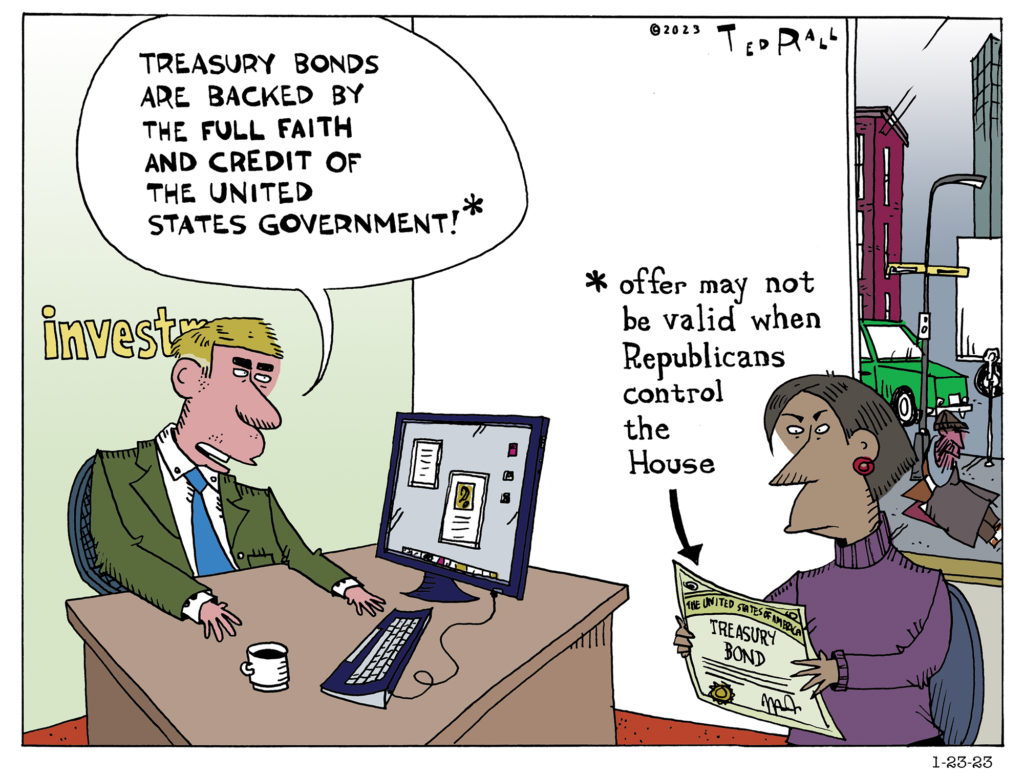When Republicans captured the House of Representatives this past fall, Americans were treated to the happy surprise of their rhetoric, in which they claimed they did not intend to leverage the debt ceiling and risk economic damage as they had done in the past. Unfortunately, that is no longer the case. GOP hardliners are holding the creditworthiness of the country hostage even when they vote for the same increased deficits they pretend to care about.
AL JAZEERA COLUMN: Tied to a Drowning Man
The interconnectedness of the world economy means that US economic woes will have severe effects on others.
During the Tajik Civil War of the late 1990s soldiers loyal to the central government found an ingeniously simple way to conserve bullets while massacring members of the Taliban-trained opposition movement. They tied their victims together with rope and chucked them into the Pyanj, the river that marks the border with Afghanistan. “As long as one of them couldn’t swim,” explained a survivor of that forgotten hangover of the Soviet collapse as he walked me to one of the promontories used for this act of genocide, “they all died.”
Such is the state of today’s integrated global economy.
Interdependence, liberal economists believe, furthers peace—a sort of economic mutual assured destruction. If China or the United States were to attack the other, the attacker would suffer grave consequences. But as the U.S. economy deteriorates from the Lost Decade of the 2000s through the post-2008 meltdown into what is increasingly looking like Marx’s classic crisis of late-stage capitalism, internationalization looks more like a suicide pact.
Like those Tajiks whose fates were linked by tightly-tied lengths of cheap rope, Europe, China and most of the rest of the world are bound to the United States—a nation that seems both unable to swim and unwilling to learn.
The collapse of the Soviet Union, a process that began in the 1970s and culminated with dissolution in 1991, had wide-ranging international implications. Russia became a mafia-run narco-state; millions perished of famine. Weakened Russian control of Central Asia, especially Afghanistan, set the stage for an emboldened and highly organized radical Islamist movement. Not least, it left the United States as the world’s last remaining superpower.
From an economic perspective, however, the effects were basically neutral. Coupled with its reliance on state-owned manufacturing industries to minimize dependence upon foreign trade, the USSR’s use of a closed currency ensured that other countries were not significantly impacted when the ruble went into a tailspin.
Partly due to its wild deficit spending on the gigantic military infrastructure it claimed was necessary to fight the Cold War—and then, after brief talk of a “peace dividend” during the 1990s, even more profligacy on the Global War on Terror—now the United States is, like the Soviet Union before it, staring down the barrel of economic apocalypse.
AL JAZEERA COLUMN: How the US Media Marginalizes Dissent
The US media derides views outside of the mainstream as ‘un-serious’, and our democracy suffers as a result.
“Over the past few weeks, Washington has seemed dysfunctional,” conservative columnist David Brooks opined recently in The New York Times. “Public disgust [about the debt ceiling crisis] has risen to epic levels. Yet through all this, serious people—Barack Obama, John Boehner, the members of the Gang of Six—have soldiered on.”
Here’s some of what Peter Coy of Business Week magazine had to say about the same issue: “There is a comforting story about the debt ceiling that goes like this: Back in the 1990s, the U.S. was shrinking its national debt at a rapid pace. Serious people actually worried about dislocations from having too little government debt…”
Fox News, the Murdoch-owned house organ of America’s official right-wing, asserted: “No one seriously thinks that the U.S. will not honor its obligations, whatever happens with the current impasse on President Obama’s requested increase to the government’s $14.3 trillion borrowing limit.”
“Serious people.”
“No one seriously thinks.”
The American media deploys a deep and varied arsenal of rhetorical devices in order to marginalize opinions, people and organizations as “outside the mainstream” and therefore not worth listening to. For the most part the people and groups being declaimed belong to the political Left. To take one example, the Green Party—well-organized in all 50 states—is never quoted in newspapers or invited to send a representative to television programs that purport to present “both sides” of a political issue. (In the United States, “both sides” means the back-and-forth between center-right Democrats and rightist Republicans.)
Marginalization is the intentional decision to exclude a voice in order to prevent a “dangerous” opinion from gaining currency, to block a politician or movement from becoming more powerful, or both. In 2000 the media-backed consortium that sponsored the presidential debate between Vice President Al Gore and Texas Governor George W. Bush banned Green Party candidate Ralph Nader from participating. Security goons even threatened to arrest him when he showed up with a ticket and asked to be seated in the audience. Nader is a liberal consumer advocate who became famous in the U.S. for stridently advocating for safety regulations, particularly on automobiles.

